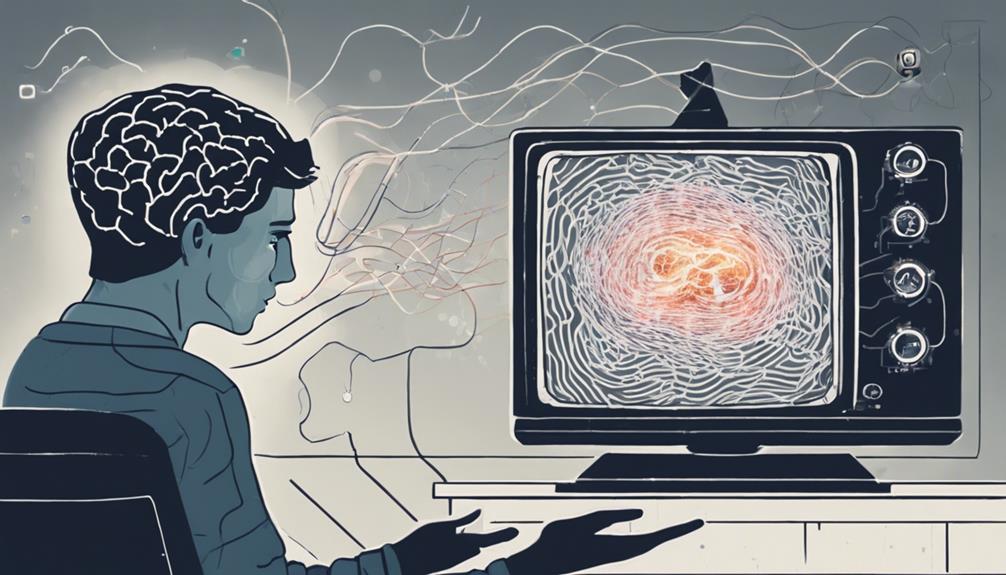Subliminal hypnosis techniques are being studied for their impact on subconscious processes and behavior. Research reveals hidden cues can influence brain activity and neural pathways, with functional MRI studies showing specific brain region activation. However, challenges in measuring stimuli impact and cognitive biases can skew findings. While subliminal messages may affect decision-making and attitudes, ethical considerations around autonomy and well-being are crucial. Further exploration of research findings and limitations in subliminal hypnosis techniques offers insight into their potential benefits and pitfalls.
Effectiveness of Subliminal Hypnosis

The effectiveness of subliminal hypnosis has been a subject of ongoing research and debate among scholars and practitioners in the field of psychology. One key aspect of this effectiveness lies in how hidden cues presented in subliminal messages can influence brain activity. Studies have shown that these hidden cues, often presented below the conscious awareness threshold, can impact neural pathways related to decision-making, emotions, and behavior.
Research on brain activity during exposure to subliminal messages has revealed interesting findings. Functional magnetic resonance imaging (fMRI) studies have demonstrated that subliminal stimuli can activate specific brain regions associated with processing emotions and memories, even when individuals are not consciously aware of the stimuli. This suggests that subliminal hypnosis techniques may have the potential to influence subconscious processes that regulate thoughts and behaviors.
Understanding the intricate relationship between hidden cues in subliminal messages and their effects on brain activity is essential for evaluating the efficacy of subliminal hypnosis as a therapeutic tool. Further research in this area can provide valuable insights into the mechanisms underlying subliminal hypnosis techniques and their potential applications in psychological interventions.
Types of Subliminal Messages
Research on subliminal messages has identified various types employed in subliminal hypnosis techniques. These messages often contain hidden suggestions that aim to exert subconscious influence on individuals.
One common type of subliminal message involves covert communication, where information is presented in a subtle or disguised manner to bypass conscious awareness. This form of messaging can be used strategically for psychological manipulation, influencing behaviors, thoughts, or emotions without the individual being fully conscious of the stimuli.
Subliminal messages can be conveyed through various mediums, such as visual images, auditory cues, or even through written or spoken language. The effectiveness of these messages in inducing changes in behavior or beliefs is a subject of ongoing debate within the scientific community.
While some studies suggest that subliminal messages can have a subtle impact on individuals, the extent of their influence and ethical implications remain topics of discussion and further research. Understanding the different types of subliminal messages is crucial for evaluating their potential effects on individuals' perceptions and behaviors.
Research on Subliminal Perception

Studies on subliminal perception have delved into the intricate mechanisms through which stimuli below the threshold of conscious awareness can impact individuals' cognitive processes. Research on subliminal perception has particularly focused on areas such as subliminal advertising and subconscious influence.
Subliminal advertising involves the presentation of messages in advertisements that are not consciously perceived by individuals but may still influence their attitudes or behavior. Through controlled experiments and neuroimaging techniques, researchers have sought to understand how subliminal stimuli can activate brain regions associated with decision-making and emotional processing, indicating a potential subconscious influence.
Studies in this field have shown mixed results, with some suggesting that subliminal perception can indeed affect individuals' perceptions and behaviors, while others argue that the effects may be minimal or short-lived. It is essential for researchers to consider the complexities of individual differences, contextual factors, and the limitations of subliminal perception studies when interpreting the findings related to subliminal advertising and subconscious influence.
Limitations of Subliminal Hypnosis
Several factors contribute to the limitations of subliminal hypnosis techniques. Research challenges play a significant role in understanding the efficacy of subliminal messaging.
One of the primary research challenges is the difficulty in measuring the actual impact of subliminal stimuli on an individual's behavior or thoughts. Due to the subtlety of subliminal messages, it is often hard to determine their precise influence, leading to inconsistencies in research findings.
Moreover, cognitive biases present another limitation when studying subliminal hypnosis. Individuals may have preconceived notions or expectations about the effects of subliminal messages, which can skew the results of experiments. Confirmation bias, where researchers interpret results in a way that confirms their beliefs, can also hinder the objective analysis of subliminal messaging effects.
These limitations highlight the complexity involved in studying subliminal hypnosis techniques. Overcoming these research challenges and addressing cognitive biases are crucial steps in advancing our understanding of the true impact of subliminal messaging on the human mind.
Impact of Subliminal Messaging

Understanding the impact of subliminal messaging involves exploring how these subtle stimuli can potentially influence individuals' subconscious thoughts and behaviors. Research suggests that subliminal messages can have a subconscious influence on individuals, leading to changes in behavior or attitudes without their conscious awareness. This form of psychological manipulation operates by presenting hidden suggestions that bypass conscious cognitive processing and directly target the subconscious mind.
Studies have shown that subliminal messaging can affect decision-making, attitudes, and preferences. For example, a study conducted by researchers at the University of Amsterdam found that participants exposed to subliminal messages related to thirst were more likely to choose a bottle of water over other beverage options. This indicates the power of subliminal messaging in influencing consumer choices.
However, it is essential to consider the ethical implications of using subliminal messaging for manipulation. While it can be a powerful tool in marketing and persuasion, the potential for exploiting individuals' subconscious vulnerabilities raises ethical concerns that must be carefully addressed.
Ethical Considerations in Hypnosis
An examination of ethical considerations in hypnosis reveals the importance of safeguarding individuals' autonomy and well-being during the practice of hypnotic techniques. In the realm of hypnosis, obtaining informed consent is crucial to ensure that individuals are aware of the procedures, potential risks, and benefits associated with hypnosis. Consent implications in hypnosis involve ensuring that participants have the capacity to make autonomous decisions regarding their involvement in hypnotic sessions.
Furthermore, ethical concerns arise regarding the potential for psychological manipulation during hypnosis. Practitioners must adhere to strict ethical guidelines to prevent the misuse of hypnotic techniques for coercive or deceptive purposes.
It is essential to prioritize the well-being and mental health of individuals undergoing hypnosis, ensuring that any suggestions made during the process are in the best interest of the participant and align with their values and goals.
Frequently Asked Questions
Can Subliminal Hypnosis Erase Memories?
Memory manipulation through subliminal hypnosis raises ethical considerations due to its potential impact on individuals' autonomy and well-being. Research on the effectiveness of erasing memories through subliminal hypnosis remains limited, requiring further examination and scrutiny.
Are Subliminal Messages Always Subconscious?
In the realm of psychology, subliminal messages typically bypass conscious perception, engaging in subliminal processing. This phenomenon raises ethical implications regarding its influence on consumer behavior, highlighting the importance of understanding and regulating such techniques in various contexts.
How Long Do Subliminal Effects Last?
The duration of subliminal effects can vary based on factors like repetition, personal susceptibility, and message relevance. Long-term impact may occur when messages align with core beliefs, influencing memory retention and behavior subtly over time.
Can Anyone Resist Subliminal Messaging?
Resistance to subliminal messaging varies among individuals due to factors like awareness, cognitive processing, and personal beliefs. Research suggests that while some may resist its effects, others might be influenced, highlighting the complexity of its effectiveness.
Is Subliminal Hypnosis Safe for Children?
When considering subliminal hypnosis for children, ethical considerations are paramount. Parental consent is crucial, as potential dangers and psychological impact may exist. Research on safety and efficacy is limited, highlighting the need for caution.
Conclusion
In conclusion, the effectiveness of subliminal hypnosis techniques remains a topic of debate due to conflicting research findings and limitations in study methodologies.
While some studies suggest potential benefits in influencing behavior and attitudes, others question the reliability and ethical implications of subliminal messaging.
Further research is needed to fully understand the impact of subliminal hypnosis and to address the ethical considerations surrounding its use.


















